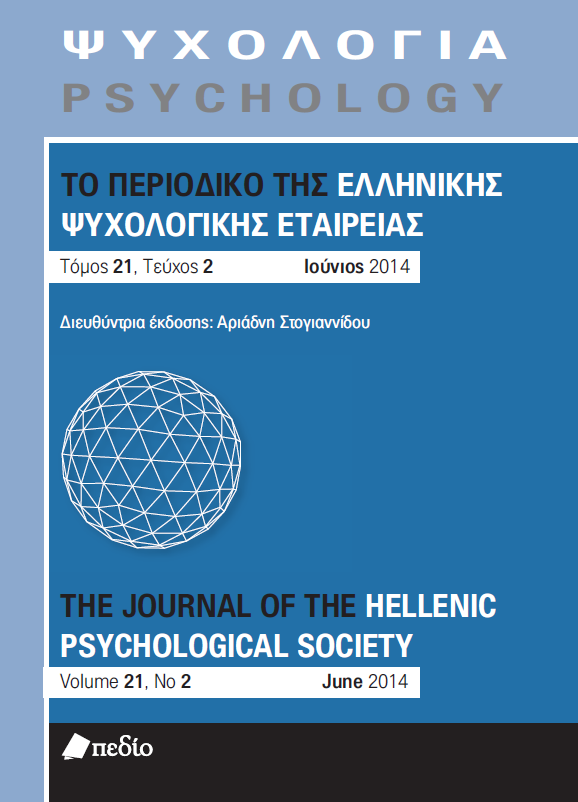Η ψυχοκοινωνική υγεία των οικογενειών με παιδιά με διαταραχές αυτιστικού φάσματος

Περίληψη
Σκοπός της παρούσας μελέτης ήταν η διερεύνηση ύπαρξης συμπτωμάτων κατάθλιψης στους γονείς και αδέρφια οικογενειών που έχουν παιδί με διαταραχές αυτιστικού φάσματος. Η εκτίμηση των συμπτωμάτων της κατάθλιψης στους γονείς (N=58) έγινε με τη χρήση της κλίμακας Βeck Depression Inventory (B.D.I; Beck & Beamesderfer, 1974) ενώ για την ανίχνευση συμπτωμάτων κατάθλιψης στα αδέλφια (N=28) χρησιμοποιήθηκε το ερωτηματολόγιο Youth Self Report (YSR;
Achenbach & Rescorla, 2001). Από την ανάλυση των αποτελεσμάτων της παρούσας έρευνας φάνηκε ότι οι γονείς παιδιών με αυτισμό παρουσίαζαν συμπτώματα κατάθλιψης, με τις μητέρες να συγκεντρώνουν υψηλότερη βαθμολογία σε σχέση με τους συντρόφους τους. Επιπλέον, η καταθλιπτική συμπτωματολογία σε έναν από τους δύο γονείς συσχετίστηκε στατιστικά σημαντικά με την ύπαρξη κατάθλιψης στον άλλον. Από την ανάλυση των δεδομένων που συλλέχθηκαν για τη μελέτη ύπαρξης συμπτωμάτων κατάθλιψης στα αδέλφια φάνηκε ότι δεν υπήρχαν συμπτώματα κατάθλιψης και ο βαθμός εκδήλωσης εσωτερικευμένων προβλημάτων ήταν στα φυσιολογικά όρια. Για την ερμηνεία των ευρημάτων συνυπολογίστηκαν ποικίλοι παράγοντες τόσο σε ατομικό-οικογενειακό όσο και σε ευρύτερο κοινωνικό επίπεδο.
Λεπτομέρειες άρθρου
- Πώς να δημιουργήσετε Αναφορές
-
Ευστρατοπούλου Μ., Μιλτσακάκη Σ., & Πλιόγκου Β. (2020). Η ψυχοκοινωνική υγεία των οικογενειών με παιδιά με διαταραχές αυτιστικού φάσματος. Ψυχολογία: το περιοδικό της Ελληνικής Ψυχολογικής Εταιρείας, 21(2), 218–232. https://doi.org/10.12681/psy_hps.23277
- Τεύχος
- Τόμ. 21 Αρ. 2 (2014)
- Ενότητα
- ΕΜΠΕΙΡΙΚΕΣ ΕΡΓΑΣΙΕΣ

Αυτή η εργασία είναι αδειοδοτημένη υπό το Creative Commons Attribution-ShareAlike 4.0 International License.
Το περιοδικό ΨΥΧΟΛΟΓΙΑ έχει υιοθετήσει μία πολιτική Platinum open-access. Τα έξοδα υποβολής, επεξεργασίας ή δημοσίευσης των εργασιών καλύπτονται από την Ελληνική Ψυχολογική Εταιρεία. Τα πνευματικά δικαιώματα των δημοσιευμένων εργασιών προστατεύονται από την άδεια 'Creative Commons Attribution-ShareAlike 4.0 International'. Οι Συγγραφείς διατηρούν τα Πνευματικά Δικαιώματα και χορηγούν στο περιοδικό το δικαίωμα της πρώτης δημοσίευσης. Η άδεια αυτή επιτρέπει σε τρίτους, να χρησιμοποιούν την εργασία σε οποιαδήποτε μορφή, με την προϋπόθεση της διατήρησης των διατυπώσεων που προβλέπονται στην άδεια σχετικά με την αναφορά στον αρχικό δημιουργό και την αρχική δημοσίευση στο περιοδικό ΨΥΧΟΛΟΓΙΑ. Επιπλέον, κάθε διανομή της εργασίας οφείλει να γίνεται με τους ίδιους όρους διανομής, δηλαδή με την ίδια άδεια Creative Commons.


